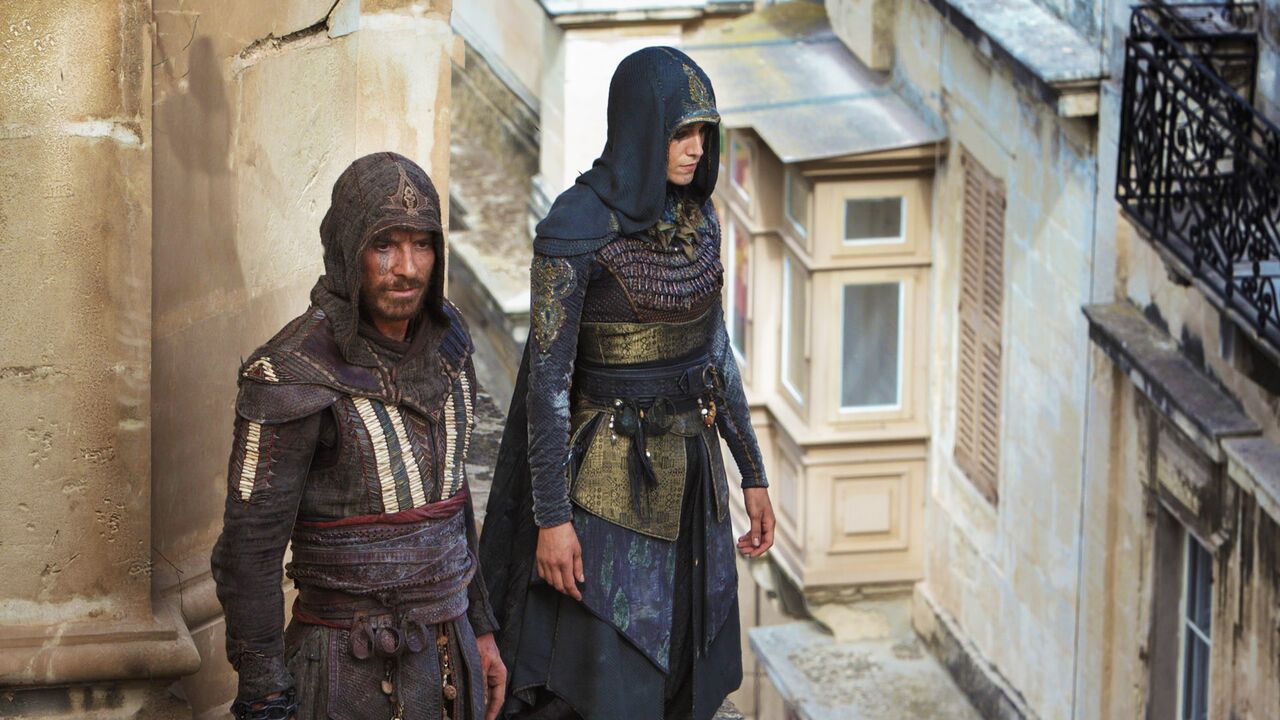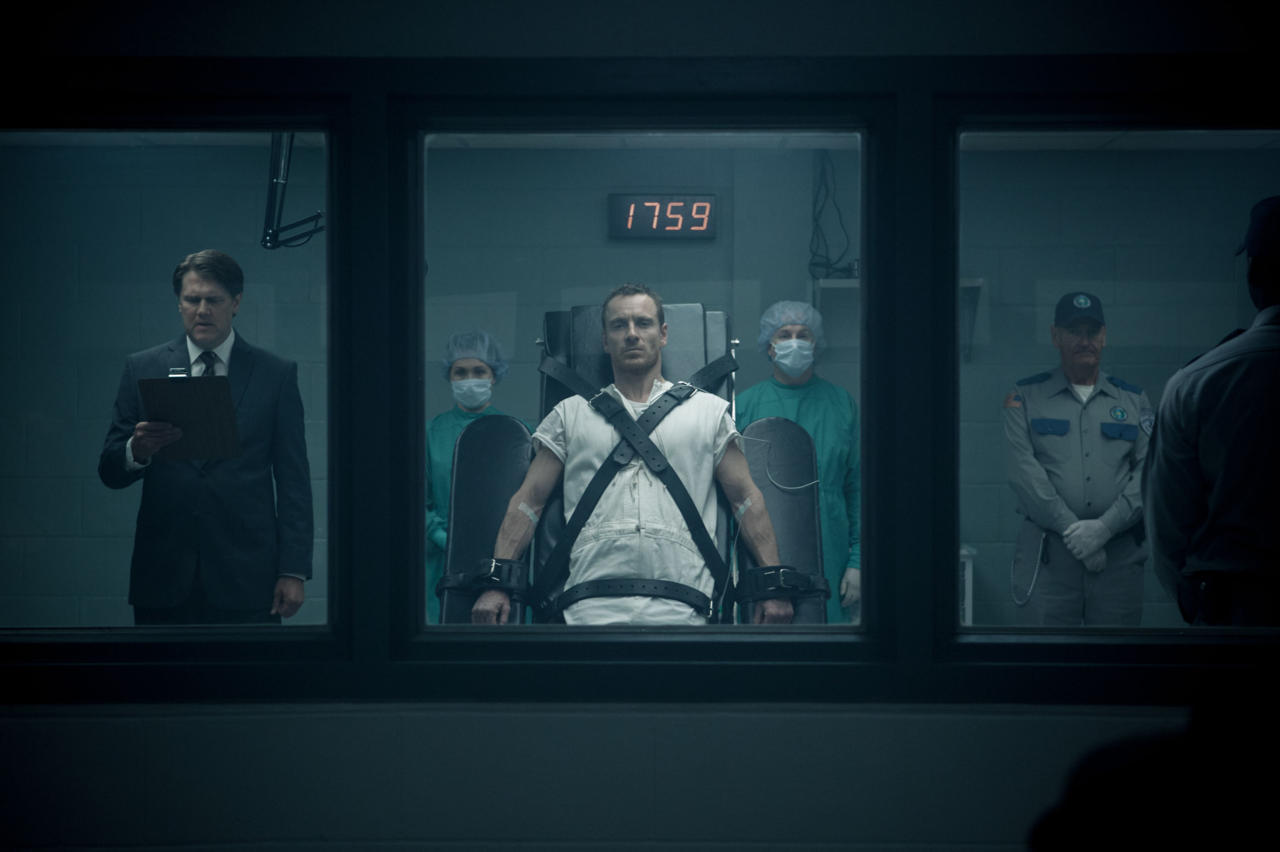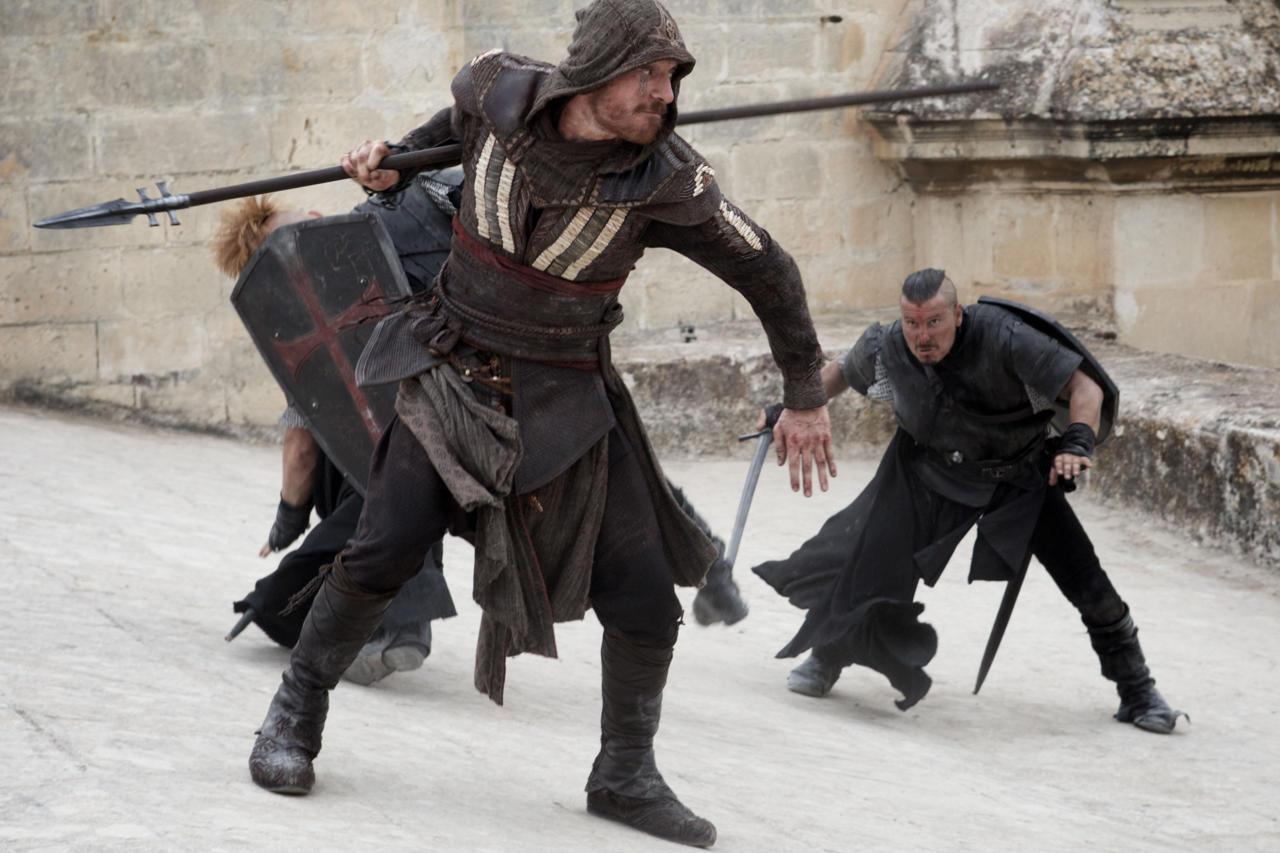With Marvel's superheroes dominating the big screen, it's hardly surprising that games publishers want their own lucrative properties on film. Rarely has such a plan worked; from Doom to Street Fighter, movies based on games have usually landed somewhere on the spectrum between forgettable and downright awful.
Ubisoft, now armed with a new motion pictures division, wants to buck that trend. The division's first self-made film, Assassin's Creed, stars Michael Fassbender and is directed by Justin Kurzel, who is coming off a critically acclaimed adaptation of Macbeth. With movies based on the Splinter Cell, Far Cry, Ghost Recon, and Watch Dogs properties also in the works, Ubisoft clearly sees the expansion into films as a means to maximise the value of its brands. Assassin's Creed will be the acid test to see how far along the corporation is in achieving its Hollywood dreams.
During a recent set visit, GameSpot talked to Fassbender and Kurzel, as well as Jean-Julien Baronnet, former head of Ubisoft Pictures, to discuss a whole range of subjects, including how they aim to make Assassin's Creed a distinct moviegoing experience, how the picture differs from the games, and the challenge of living up to fan expectations.
GameSpot: What's so attractive about the Assassin's Creed franchise that will make compelling viewing for movie audiences?
Justin Kurzel: I think the games are really cinematic anyway. You can just look at that in terms of the gameplay but also the trailers. It's not a superhero kind of game, it's real people doing extraordinary things. Our story is an origin story, a man in the present day discovering he's an Assassin. That whole idea of memory travel and being able to be informed as to who you are through your DNA is really compelling stuff. Any film would be lucky to have that sort of storyline. It's a very rich world and all the moments of history that you go back to in the game are beautifully recreated. It's almost like doing a period piece with this really interesting conceptual world in the present day in terms of the Animus and so forth. It's just really rich ground.
Video game movies before it have poisoned the well somewhat. Do you feel the movie has an uphill battle in terms of perception or do you think it could break through in the way Marvel has with its superhero films?
Kurzel: I think it's the big challenge. How do you make something that exists as a game as a 120-minute story and also set up the storylines and characters? Assassin's Creed is very complex in terms of the Animus, the present-day world, and how that relates to the period world. You're having to invent a story to take all those different elements of the game and also stay faithful to what fans expect. It is a really big challenge.
At the same time, I've always approached this as a film. I respect the game and have spent a lot of time with the game but at a certain point you have to start looking at this as a film and how it works as one.
I'm not sure [about perception], I haven't been thinking about it. I just did Macbeth and that's been done a thousand times. It has massive baggage like anything else, so I think you have to just embrace it. You have to just go with it. There's something about Assassin's Creed that feels very real and different from other games. That makes it feel more tangible as a piece of cinema.

Michael, video game movie adaptations don't have the best reputation. What was it about Assassin's Creed that set it apart and drew you to it, considering it could be seen as risky?
Michael Fassbender: It's not really risky, considering somebody has got to do it right once. We figured the odds are stacked in our favour [Laughs].
It was just that time that I sat down with Ubisoft and they started to explain it to me. There's a lot of action-adventure films out there at the moment, but what was really unique about this one, what elevated it above other action-adventure fantasy films was the idea of DNA memories. It seems like a very plausible scientific theory, that we carry around in us the knowledge of our ancestors. That's how we know not to eat that berry, but eat this one. Certain things like when you enter a room and it's a dangerous one, the temperature drops and you feel something physically. That comes from, perhaps, knowledge from ancestors that's in our DNA. I thought that was really something that would take the audience on a more immersive journey.
It's kind of like The Matrix … setting something up outside of the fantasy world for the audience to believe in and go, "Wow I really do think that's true, we call it instinct but it's essentially in our DNA from our ancestors." That for me really elevated it. And then I love the Templar versus Assassin battle that has been going on since the beginning of time. The idea of Adam and Eve being the first Assassins, that's pretty cool.
This isn't Star Wars, there isn't a dark side and light side. We have very ambiguous morals going on. It's a very grey world where both sides are contradictory of their belief systems. They have to bend them at certain times, skew them a little bit. I like that. I always think it's more interesting when you've got a grey area as opposed to black and white.
This isn't Star Wars, there isn't a dark side and light side. We have very ambiguous morals going on.
Michael Fassbender
How do you find the balance between realism and representing the game elements?
Kurzel: There are moments, like doing a leap of faith, that are real. There are great stories to those. Damien Walters is one of the best freefallers in the world so why not shoot it instead of having an animated character? I think that's what is so great about the game; it's human endeavour and not a super power. Then there are moments, like another leap of faith, which is much more in keeping with some of the style choices in the game. I think it's a balance between the two. We're putting cameras on the knife blades, so you can see-
[At this point Justin runs off to watch Damien leap off a platform suspended over 100 feet in the air and freefall, with no bungee cords or safety harnesses, into an inflatable landing pad.]
...Yeah, so, why would you want to do it digitally when you can do it for real? It's a guy up there for the first time, it's the highest jump he's ever done. What's in the film is the extra bit of human risk and endeavour that makes it possible to be an assassin. That's what we're trying to do. All the stunts are being done on camera by some of the best stunt guys in the world.
What I'm saying is, how do you respect the game and respect the motifs in there, but at the same time create a piece of cinema that feels real to bring these assassins to life? That's why we're really concentrating on a fantastic cast. When Michael said he was going to play an assassin, that felt so right, in terms of the hood and the way he looks and feels. For us it was, how do we make the audience really feel that it was possible and we shot it. That's why shot in real locations, we did a real leap of faith. All this stuff we cared about in terms of being respectful to the style of the game, while at the same time just trying to ground it into a piece of film.
This is a big action movie adventure, but Michael is amazingly talented, do you feel like you're taking full advantage of his range of skills as an actor?
Kurzel: He's playing two different characters in two different periods. One is Spanish and one is a present-day character, so Michael is not only performing as two characters but doing two sets of stunts. He's prepared a long time for that, so this film is definitely testing his range to the fullest.
Fassbender: I don't really play video games so I'm not up to speed with any games out there to be honest. I'd seen the posters and some of the trailers, then when I met the guys from Ubisoft and they started to tell me what the whole game was about, the concept behind it, the two rival factions that have been warring since the beginning of time--Templars, Assassins, the idea of DNA memory--I was like, wow, this is great, this lends itself very well to a cinematic storytelling realm outside of the game stuff.
When I came on board it was about refining all of this stuff, simplifying it because we're introducing these concepts that people that may not have played the game at all, so we want to cater for both. In terms of the games, I definitely started playing and watching for the movement, just to get the idea of the shape I'm going to be pulling, basically. And the physicalisation of the character.

Why did Ubisoft pick Michael as the hero?
Jean-Julien Baronnet: For several reasons, first because we think he's the best actor of his generation. We needed an extraordinary actor to play both [the past and present hero]. The second reason is because, as a professional, Michael has done indie movies and mainstream movies. He did Hunger and 12 Years a Slave, but also X-Men and Prometheus. It's exactly like Tom Hardy and Splinter Cell. We chose Tom [for the Splinter Cell movie] because he's doing indie movies like Bronson, but also Batman and Mad Max. This is a symbol of what we want to do in the movie, we want it to be mainstream, but with content.
The third element is an Assassin is very [elegant] and Michael is somebody that's very elegant but also very brittle. We needed to have a combination of someone that can be [graceful] in choreography, but also be very tough and [has] mystery. For those three reasons, Michael was the best choice.
Fans of the games are going to go in looking for shades of Altair, Ezio, Edward. What do you think makes your Assassin, Aguilar, distinct from the ones before him?
Fassbender: We picked a regression that's completely new. We're not really dealing with any parallels with the game, we're introducing new characters with Callum and Aguilar. We're trying to stay true to the core things: the Animus, the DNA memories of the characters, the artefacts. That's enough information to be giving new audiences that haven't played the game.
Likewise, with the characters we're just introducing new ones. We didn't reference any of the characters from the games. Aguilar is somebody who is very different to Callum because he's somebody that belongs to the creed, he belongs to a family and has devoted his life to that ethos. Whereas Callum is a drifter and a loner, he hasn't found something that he belongs to, and doesn't have a family because that was taken away from him.
He's going to learn about his new family through Aguilar, who is there to teach him in the regressions, but also in the bleeding effect. It's trying to use Aguilar to inform our modern-day character as much as anything that we see of him in his own right. It's very important that Aguilar is there to teach Callum.
With the characters we're just introducing new ones. We didn't reference any of the characters from the games.
Michael Fassbender
Since you're doing the first movie, is there a mandate to focus on setting up a universe?
Kurzel: I think it has enormous possibilities because that one character can have 30 ancestors, so it's a pretty perfect concept to start to go into fresh stories, fresh periods. I also think that the Templars and Assassins aren't plainly good or bad, they contradict each other. Templars can suddenly become good and Assassin's can turn. It's really rich in that way, there's a wonderful grey area where the two ideologies are free will and benign control. I guess that's why I was so into it, the material is really rich and full of possibilities. It's really then about how to harness that and focus it onto one thing.
The games explore moral greys and sometimes that means they don't wrap up neatly. Hollywood movies tend to end with good guys winning and bad guys losing. Are you conforming to the Hollywood blueprint or following the example of the games?
Fassbender: Myself and Justin tend to go for the grey areas. I just think that's the stuff we found to be really interesting in the games, that and the philosophy behind it. It's so interesting to find out, when talking to psychologists which we brought in, about Yungean references and what happens in the Animus [as well as] when you come out. We use terms like "splitting" and "ego integrity." We're dealing very much with the mind, as opposed to heart rate 150 over whatever, which we've all heard a million times. So we've come up with a very specific language that is going to deal with that.
In terms of the Templars and the Assassins, we want to show them both in good and bad lights. We think that's what's really interesting about the game, that it is so complex. You talk to people like psychoanalysts who have kids playing the games and they're like, "I love this Assassin's Creed thing, it's got so many elements to it."
Morally, it is a very grey area and, hopefully, when people leave the cinema they start talking about how they feel about this and that, then it becomes a conversation after the film. Then it leads to the next day, and it stimulates and provokes, which is what I feel the games do.
The idea that Templars are there for the advancement of the human race through science, and have done great things along the way, as well as horrifically bad things. Then the Assassins are killing people. It's a very adult world. That's something that drew me to it and for sure Justin as well.

You've said you want to keep the movie and game universes separate, but the recent games have struggled with depicting that nuance. Is there any scope for Ubisoft to use the movie material to strengthen its game universe?
Baronnet: We never say we want to separate the game and the movies, because that'd be a huge mistake. We just say that if we want make the movie, we can't make it like the game. For instance, in the games the gameplay and universe are super important. For the movie the universe is key, but if you don't have a character it won't work. The game developers came and saw some stuff they were very inspired by. I'm sure we'll have some bridge from the movie to the games, but that's their decision.
And on the reverse, we have been very much inspired by the games. We put in the games some clues that will go in the movie. We are bridging on the marketing side and on the creative side. I'm not the decision maker for the games, so I don't know what [and if] the games will cherry-pick from the movie, but I know that there's some stuff they liked very much. We've cherry-picked some elements of the game and use it in the movie, so we want to work together in a strong partnership.
Assassin's Creed opens on December 21, 2016.
